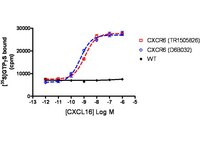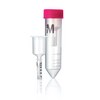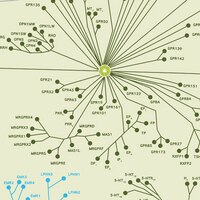Pathogenic role of the CXCL16-CXCR6 pathway in rheumatoid arthritis.
Nanki, Toshihiro, et al.
Arthritis Rheum., 52: 3004-14 (2005)
2004
Show Abstract
OBJECTIVE: Rheumatoid arthritis (RA) is a chronic inflammatory disease associated with massive T cell infiltration into the synovium. The accumulated T cells express type 1 cytokines, such as interferon-gamma (IFNgamma) and tumor necrosis factor alpha, and activated markers of inflammation, such as CD154 and inducible costimulator (ICOS). It is thought that chemokines contribute to T cell accumulation in the synovium. In this study, we examined the role of CXCL16 and CXCR6 in T cell migration and stimulation in RA synovium. METHODS: Expression of CXCL16 and CXCR6 was analyzed by immunohistochemistry, reverse transcription-polymerase chain reaction, Western blotting, and/or flow cytometry. Migration activity was assessed using a chemotaxis chamber. IFNgamma production was analyzed by enzyme-linked immunosorbent assay. The effect of anti-CXCL16 monoclonal antibody on murine collagen-induced arthritis (CIA) was evaluated. RESULTS: CXCL16 was expressed in RA synovium. CXCR6 was expressed more frequently on synovial T cells than in peripheral blood. Moreover, CXCR6-positive synovial T cells more frequently expressed CD154 and ICOS than did CXCR6-negative T cells. Stimulation with interleukin-15 (IL-15) up-regulated the expression of CXCR6 on peripheral blood T cells, and then stimulation with CXCL16 induced migration of IL-15-stimulated T cells and enhanced IFNgamma production. Furthermore, anti-CXCL16 monoclonal antibody significantly reduced the clinical arthritis score and reduced infiltration of inflammatory cells and bone destruction in the synovium of mice with CIA. CONCLUSION: Our results indicate that CXCL16 plays an important role in T cell accumulation and stimulation in RA synovium and suggest that CXCL16 could be a target molecule in new therapies for RA. | 16200580
 |
















 Antibody[213896-ALL].jpg)

